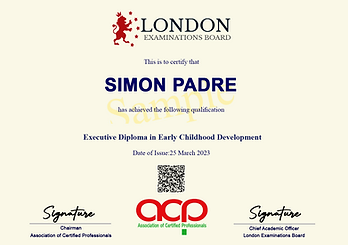PROGRAMME AIMS
This Executive Diploma has the following aims:
To provide a flexible credit accumulation pathway to enable adult learners to upgrade their skills and knowledge in the early childhood learning and development centres.
To provide adult learners who are engaged or plan to be engaged in early childhood education certificated learning which contributes to their career advancement.
PROGRAMME LEARNING OUTCOME
On completion of this Executive Diploma learners will be able to:
- Develop a more comprehensive body of knowledge to apply and undertake broader functional areas in early childhood education provision.
- Develop a range of skills including personal skills, techniques, and attributes essential for effective and successful performance in the context of early childhood provision.
PROGRAMME STRUCTURE
Executive Diploma Modules and Credits
Each of the following numbered Modules carry 20 credits under the Qualifications and
Credit Framework at Level 4:
Module 1: Foundations of Early Childhood Education
Module 2: Early Childhood Health, Safety, and Nutrition
Module 3: Growth and Development of a Holistic Child
DURATION OF EACH MODULE
Each Module can be completed over 1 month of intensive study and learners are given up to 2 months to complete each module:
Study load
The recommended notional hours for each Module is 200 hours.
Assessment
There is an MCQ assessment at the end of each Module. Learners will need to achieve a pass mark of 50% in order to receive a pass for the Module.
PROGRAMME SPECIFICATIONS
Module 1 – Foundations of Early Childhood Education
Course Description:
The course introduces students to the basic concepts and principles of early childhood education.
This review includes an introduction to early childhood education, the history of the child, various approaches in early childhood education, relevant laws and regulations on protection of children, code of ethical conduct, core competencies for the field and developmentally appropriate practices, the role of the early childhood professional, and (d) current early childhood education issues.
Learning Outcomes:
Upon completion of this module, students would be able to:
- Trace the history and development of early childhood education
- Compare the different philosophical approaches in early childhood education
- Evaluate relevant acts, rules and regulations protecting the well-being of the child
- Create and present an effective philosophy statement for early childhood education.
- Trace the various theories related to children’s learning and development.
Indicative Content / Topics:
- Trace the history and development of early childhood education
- Philosophy of early childhood education – Froebel, Waldorf Steiner, Montessori, High Scope
- Benefits of investment in early childhood education
- Theories related to children’s learning and development
- Describe the role of the early childhood profession and current thought and practice
• Demonstrate an awareness of current trends and issues in the field of early childhood education
Recommended study time in notional hours
- 200 hours for each Module
Module 2 – Health, Nutrition, and Safety of Children
Course Description:
The course examines major issues affecting the health, nutrition, and safety of young children in early childhood settings emphasising general well-being of children and first aid as it applies to young children. Nutrition and policy considerations about pediatric medications, infectious disease control, sick child care, universal precautions and liability, and health record keeping will be discussed. Students will learn how to incorporate lessons related to health, nutrition, and safety of children into the overall programme
Learning Outcomes:
Upon completion of this module, students would be able to:
- Define health promotion and prevention in child care settings
- Identify tools for promoting good health, nutrition and safety of children
- Discuss health care policies relevant to society and childcare
- Identify and discuss the importance of infection control and health management in the community and childcare setting.
Indicative Content / Topics:
- Impact of the early years on children’s life-long health and nutritional status
- Nutritional needs of children
- Nutrition standards, guidelines, and national initiatives
- Promoting wellness of children
- Influences on children’s health and nutrition
- Meal-time environments for toddlers, preschoolers, and school-age children
- Meal plans and snacks that meet children’s nutritional needs
- Childhood diseases and symptoms
- Current trends affecting health and nutrition
Recommended study time in notional hours
- 200 hours for each Module
Module 3 – Growth and Development of a Holistic Child
Course Description:
The course examines the major theories and research findings in the physical, cognitive, language and social/emotional domains of development of young children from conception through age 8 will be the focus of this course. The work of Piaget (constructivism), Erikson (psychosocial theory), and Maslow (hierarchy of needs) will be emphasised. Emphasis will be placed on understanding children’s development in the moment and the power of observations.
Learning Outcomes:
Upon completion of this module, students would be able to:
• Explain child growth and development
• Describe the physical development of children
• Trace the intellectual development of children
• Analyse the socioemotional development of children
Indicative Content / Topics:
• Difference between growth and development
• Research methods used in studying children’s growth and development
• Physical development from infancy, toddler, early and middle childhood
• Cognitive development of children
• Emotional development of children from birth to middle childhood
• Social development of children
• Behaviour management and guidance
• Responsibilities of families, teachers, and specialists in creating supportive environments

